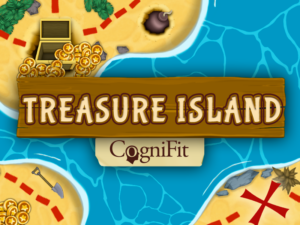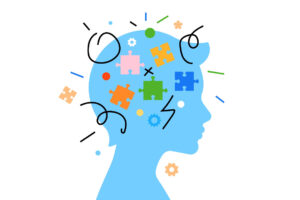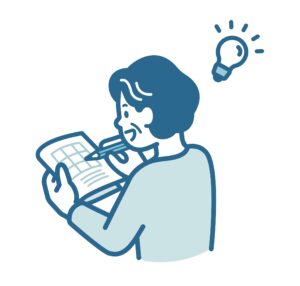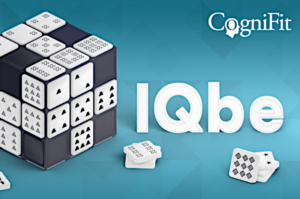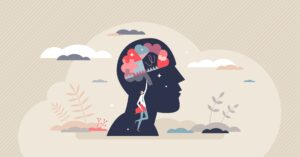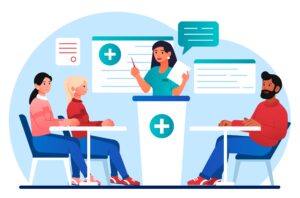
Cognitive Health: What is its meaning and how to improve it.
Do you forget things lately? Have you lost the skills you used to have? Many people worry about memory loss and skills as they get older, and feel a decline in their cognitive function.
In this article we will talk about what are the causes of this decline, what is cognitive health and steps to strengthen it. Read this article to keep your brain healthy as you get older.
Cognitive health: definition and meaning
How can we define Cognitive health? What is its meaning? Cognitive health refers mainly to thinking, learning, and memory. It also can include other components as the motor function (how the person controls movements), emotional function (how a person can manage their emotions) and sensory function (how a person feels and respond to sensations as pressure, pain, temperature, etc). A person with good cognitive health is a person who can think, learn and remember.
Therefore, “Cognition” is an important element of the brain health, and to have good cognitive health means that the brain is fit and ready to carry out life and work demands. In conclusion, cognitive health is related to brain health and its complete function. It includes areas such as memory, language, learning, emotional function, sensory function, motor function, etc.
Cognitive health and cognitive reserve: definition and difference
Now that we have defined what is cognitive health, it is important to mention a crucial concept to the understanding of cognitive health: cognitive reserve.
Cognitive reserve is your capacity of developing several thinking abilities during your life. It is also known as the ability of the brain to improvise and find other ways of completing a job. People with good cognitive reserve are more protected against memory losses and the decline of their mental skills. Cognitive reserve is developed throughout a life of education and curiosity, which helps your brain to cope with any deterioration that has to deal with. Cognitive reserve is the mind’s defense to brain damage.
The cognitive reserve is based on using the brain networks that we have in a more efficient way or on a greater capacity.
Considering all the information above, it is important to keep in mind that cognitive reserve is very important to protect people against losses and damage that can occur through aging. It could be said that cognitive reserve is a tool that helps people to develop resilience and to have more reserve to call on an older age.
Cognitive health: issues and meaning
Everyone forgets something sometimes, like misplacing your keys or blanking out on a name. That is completely normal, but if these episodes become recurrent or interfere with daily life, you may need to pay attention to your cognitive health and go to a specialized professional. If that happens to you, you may have Mild Cognitive Impairment or MCI, which is an intermediate state between normal aging and dementia.
What is Mild Cognitive Impairment?
We can say that Mild Cognitive Impairment is something between the usual cognitive decline expected with aging and the first signs of dementia and Alzheimer’s disease. According to the Alzheimer’s Association, 10% to 20% of adults older than 65 have Mild Cognitive Impairment, but it is difficult to detect.
Mild Cognitive Impairment could be categorized in two different types:
– Amnestic mild cognitive impairment. It refers to problems with memory (for example forgetting recent information and details of conversations, or misplacing personal items).
– Non-amnestic mild cognitive impairment. It refers to problems with other areas instead of memory, such as attention and concentration. It also can include difficulties in planning and decision making, language skills (for example, difficult to find or choosing words), etc. Although recognizing Mild Cognitive Impairment could be difficult, it is essential because it is the first step to identify it before it can get worse.
Cognitive Health: What are Cognitive disorders?
Related that we explained before, cognitive disorders or neurocognitive disorders are a group of mental health disorders that affect cognitive abilities such as learning, memory, perception, problem-solving, etc. In other words, cognitive disorders are a group of mental health disorders that affects some cognitive abilities. Cognitive disorders can also be defined as any disorder that affects cognitive function in a way that prevents a person from living a normal life.
The most common type of cognitive disorders are:
- Dementia
- Developmental disorders
- Motor skill disorders
- Amnesia
- Alzheimer’s disease
To shed light on the question of what causes cognitive disorders, we need to think about a variety of factors. Some scientific studies point to hormonal imbalances in the womb, genetic predisposition, environmental factors during vulnerable stages of cognitive development, particularly during infancy, or substance abuse and physical injury.
What about the symptoms?
Cognitive disorder symptoms could vary depending on the particular disorder, but some of the most common symptoms are present in most disorders. Some of them include:
- Confusion. The affected person may appear dazed too.
- Problems with motor coordination. The affected person may have a lack of balance and normal posture.
- Loss of memory. This could include a lack of coordination and other signs as forgetting names and significant faces.
- Identity confusion. About who he is and his own identity.
- Emotional symptoms. As suffering cognitive issues is frustrating, some people suffering from it react with emotional explosion. Other people with cognitive issues react with apathy.
Cognitive Health: What is the difference between Mild Cognitive Impairment and Cognitive disorders?
Although there are similar features between Mild Cognitive Impairment and Cognitive disorders, they are not the same: The symptoms developed in mild cognitive impairment do not cause any interference with normal daily life activities. On the other hand, cognitive disorders symptoms interfere with a person’s normal daily life.
If, after reading this, you believe that you or one of your loved ones may be suffering from Mild Cognitive Impairment or Cognitive disorders, you may need to contact a mental health professional who can evaluate your case.
How can you strengthen your cognitive health?: Cognitive health exercises and some advice.
Not everything is negative! The good news is cognitive issues can be prevented or delayed putting your brain in shape. People can maintain their brains fit through activities that are destined to improve cognitive functioning: attention, memory and concentration exercises, problem-solving, planning, etc.
So, what can you do to stimulate your brain and have a good cognitive health? Different researches and studies aimed that there are some different advice to follow:
1. Eat Healthy foods: a plant-based diet.
Different studies show that a diet based on high amounts of plant-based foods like fruits (especially berries), green leafy vegetables, whole grains, beans, nuts and olive oil is associated with slower mental decline in older adults. It is important to drink enough water and other fluids too.
2. Be physically active: exercise regularly.
It is important to do at least 30 minutes to an hour of moderate-intensity exercise three to five times a week. We know that the benefit of exercising regularly is incredible to prevent or delay heart disease, diabetes and other diseases. Studies also show that physical activity has benefits for the brain too. Some studies have shown that exercise can help to improve learning and spatial memory. It is also important to take care of your health limiting the use of alcohol and quit smoking.
3. Get enough sleep.
Generally, experts recommend sleeping seven or eight hours each night. When you sleep, the functions of your brain are still active, processing information. It is important to have good quality and enough quantity of sleep as your brain can go through the five different stages of sleep. That helps you to process new information.
4. Manage your stress
Neurologists say that the best ally could be laughter. It is important to have a positive attitude towards life and avoiding or manage stress to take care of your brain.
5. Stay connected with social activities and contacts.
It is essential to visit family and friends and to join programs in your community. Participating in social activities may lower the risk of some brain decline and other health problems. Be connecting with other people through social activities and programs keep your brain active and also help you to feel part of a community and less isolated. This is essential to improve your well-being and to keep your brain safe.
6. Keep your mind active and continue to challenge your brain.
Many people who participate in volunteer programs or have hobbies claim that they feel happy and healthy. It is important to be intellectually engaged to fit and benefit your brain. Some ideas of activities that can keep your mind active: reading books or magazines, taking classes about something new, playing games, and, as we mentioned above, learning a new skill or hobby, volunteering…
All of these activities can benefit your brain, moreover: they can be fun! Now that you know all the steps to take care of your brain, start putting them into practice!
We don’t know for sure yet if these actions can prevent or delay Alzheimer’s disease, but some of them have been associated with reduced risk of developing cognitive impairment and dementia.
If you have been diagnosed with Mild Cognitive Impairment, that doesn’t mean that you are going to develop dementia or Alzheimer’s for sure, it changes from case to case. While there is no method for preventing or slowing Mild Cognitive Impairment, some studies have found that people can reduce their risk of cognitive decline by applying the steps described above.
Cognitive health in older adults
Although cognitive health is a concern, it is important to know that serious decline is not imminent, even at old age, we can prevent it and slow it down. The brain is an organ that ages like the rest of the body. The aging process and how it affects one’s daily life differs from one person to another, but we know that some cognitive abilities, like memory, decrease with age. However, other mental abilities, such as knowledge and wisdom, tend to increase.
There are some recent studies about when cognitive decline reaches its peak, but it was found a considerable variability in the age at which cognitive abilities decline throughout life. In general, we can say that the areas that experiment some decrease:
- Attention. Age interfere with attention, especially when it is necessary to multitask. It could be a challenge to pay attention to multiple traffic lanes while driving, for example.
- Memory. It declines for many people over time, but again, differences have been found for each person.
- Language skills. They are well retained during adulthood in general, but it could be a challenge to a person more than seventy years old to recall a particular word during a conversation.
However, as we say before, this process is not the same for everyone, and older people experience an improvement in other areas:
- Knowledge. Strengthened by experience.
- Vocabulary continues to improve into middle age and well retained throughout the life cycle. According to recent studies, adults can improve their cognitive health in older age by raising their fitness level. Cognitive health in old age is also influenced by other factors as “cognitive reserve.” This means that people who were more intelligent when they were younger or had better cognitive maintenance through education, occupation, or stimulating activities, maintain cognitive health better than people who were not.
Finally, some studies suggest that it is very important for the cognitive health of older people not to be alone. These studies indicate that it is essential to have an extensive social network and feel part of a group.
Bibliography
- Anderson, L. A., & McConnell, S. R. (2007). Cognitive health: an emerging public health issue. Alzheimer’s & dementia: the journal of the Alzheimer’s Association , 3 (2), S70-S73.
- Everything ages, even your brain. Don’t worry so much. It’s probably not Alzheimer’s, Lenny Brillstein, The Washington Post, April 14, 2015. Recovered from: http://www.washingtonpost.com/news/to-your-health/wp/2015/04/14/everything-ages-even-your-braindont-worry-so-much-its-probably-not-alzheimers/
- Hillman, C. H., Belopolsky, A. V., Snook, E. M., Kramer, A. F., & McAuley, E. (2004). Physical activity and executive control: implications for increased cognitive health during older adulthood. Research quarterly for exercise and sport , 75 (2), 176-185.
- Jedrziewski, M. K., Lee, V. M. Y., & Trojanowski, J. Q. (2007). Physical activity and cognitive health. Alzheimer’s & Dementia , 3 (2), 98-108.
- Laditka, J. N., Beard, R. L., Bryant, L. L., Fetterman, D., Hunter, R., Ivey, S., … & Wu, B. (2009). Promoting cognitive health: a formative research collaboration of the Healthy Aging Research Network. The Gerontologist , 49 (S1), S12-S17.
- Parletta, N., Milte, C. M., & Meyer, B. J. (2013). Nutritional modulation of cognitive function and mental health. The Journal of nutritional biochemistry , 24 (5), 725-743.
- Sperling, R. A., Aisen, P. S., Beckett, L. A., Bennett, D. A., Craft, S., Fagan, A. M., … & Park, D. C. (2011). Toward defining the preclinical stages of Alzheimer’s disease: Recommendations from the National Institute on Aging-Alzheimer’s Association workgroups on diagnostic guidelines for Alzheimer’s disease. Alzheimer’s & dementia , 7 (3), 280-292.
- Stern, Y. (2009). Cognitive reserve. Neuropsychologia, 47(10), 2015-2028.





